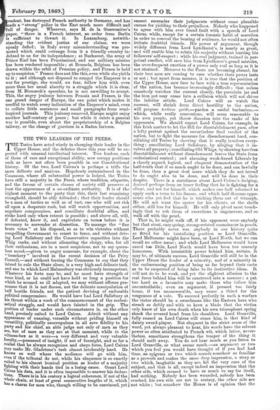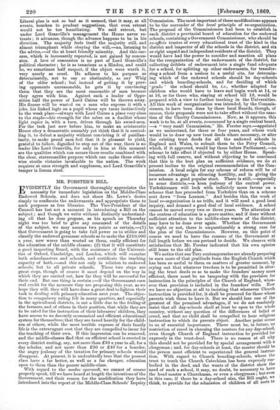• THE TWO LEADERS OF THE PEERS.
VIE Tories have acted wisely in changing their leader in the 1 Upper House, and the debates there this year will be expected with unusual intellectual interest. Two leaders, each of them of rare and exceptional ability, now occupy positions such as have not often been possible in our Constitutional history. Of the two, Lord Cairns's is perhaps a trifle the more delicate and anxious. Hopelessly outnumbered in the Commons, where all substantial power is lodged, the Tories have still a majority in the Peers, where tradition, etiquette, and the favour of certain classes of society still preserve at least the appearance of a co-ordinate authority. It is of the highest moment to the party that this, their last remaining stronghold, should be ably defended ; that their leader should be a man of tactics as well as of tact, one who will not risk all upon a desperate rush, but will watch opportunities, and negotiate compromises, and conciliate doubtful allies, and strike hard only when retreat is possible ; and above all, will, if defeated, know it, and capitulate on terms before it is necessary to surrender at discretion. To manage the "fine brute votes" at his disposal, so as to win victories without compelling Government to resort to force, and without driving Lord Salisbury and the Conservative capacities into the Whig ranks, and without alienating the clergy, who, for all their enthusiasm, are in a most suspicious, not to say querulous mood,—given to angry nonsense, for example, about the "treachery" involved in the recent decision of the Privy Council,—and without forcing the Commons to say that they intend to rule the State alone, is a very high and delicate task, and one to which Lord Malmesbury was obviously incompetent. Whatever his forte may be, and he must have strength of some kind, or he could not have held so long a position for which he seemed so ill adapted, we may without offence pronounce that it is not finesse, not the delicate manipulation of half hostile friends, not the patient devising of endurable political compromises. He would have had Lord Salisbury at his throat within a week of the commencement of the ecclesiastical struggle, and would have fainted in the grip. The position of leader under such circumstances is, on the other hand, precisely suited to Lord Cairns. Adroit without any appearance of cunning, versatile without priding himself on versatility, politically unscrupulous in all save fidelity to his Party and his chief, an able judge not only of men as they are, but of men as they are at that moment, while in the witness-box as it were—a very different and very valuable faculty,—possessed of insight, if not of foresight, and so far a realist that he always recognizes and obeys force, Lord Cairns may make Mr. Gladstone's task almost intolerably hard. He knows so well where the audience will go with him, even if the tribunal do not, while his eloquence is so exactly stated to his almost ironical position as leader of a majority fighting with their hands tied in a losing cause. Grant Lord C.alxiis his data, and it is often impossible to answer his deduction There is in his oratory a logical coherence, if not of the Whole chain, at least of great consecutive lengths of it, which ilas a charm for men who, though willing to be convinced, yet cannot surrender their judgments without some plausible excuse for yielding to their prejudices. Nobody who happened to .agree with him ever found fault with a speech of Lord Cairns, while, except for a certain forensic habit of assertion in order to conceal the bearing of evidence, he would not often irritate doubtful friends. His power of argument, though widely different from Lord Lyndhurst's, is nearly as great, and will enable him to retain his majority without hurting his followers' self-respect ; while his cool judgment, trained in perpetual conflict, will save him from Lyndhurst's grand mistake, the over-frequent exertion of a power only real as long as it is not strained. Menaces to the Peers are becoming absurd, for their best men are ceasing to care whether their power lasts or not ; but apart from menace, it is true that the position of the Upper House, now face to face with a true representation of the nation, has become increasingly difficult ; that unless somebody watches the current closely, the porcelain jar and the iron pot may come into a collision which will not shiver the inferior article. Lord Cairns will so watch the current, will shrink from direct hostility to the nation, will propose tertiurn quids,—pardon a useful barbarism,— which, while really concessions, will seem reasonable to his own people, yet throw disunion into the ranks of his opponents. We should expect Lord Cairns, for example, in this Irish matter to let the Bill for disestablishment pass, after a lofty protest against the nevertheless final verdict of the nation, but to fight the measure for disendowment hard, conciliating old Tories by showing that it really involves everything; conciliating Lord Salisbury, by alleging that it involves all property; conciliating Old Whigs, by showing how free disestablishment without disendowment leaves the State from. ecclesiastical control ; and alarming weak-kneed Liberals by a closely argued, logical, and eloquent demonstration of the half-truth that if so much ought to be done, and can lawfully be done, then a great deal more which they do not intend to do ought also to be done, and will be done in their despite. There is a stateliness about Lord Cairns's dodging, derived perhaps from an inner feeling that he is fighting for a client, and not for himself, which makes one half ashamed to apply such a term to his finesse, and which half disarms opponents who yet feel that he is tricking them out of triumph. He will not want the oyster for his clients, or the shells either, still less for himself. He will only plead most touchingly that to rob them of excretions is ungenerous, and so walk off with the pearl.
That is, he might walk off, if his opponent were anybody but that stout, easy-going, strong-wristed connoisseur in pearls. There probably never was anybody in our history quite so fitted for his tantalizing position as Lord Granville. Lord Melbourne might have been, or Lord North, but we can recall no other name ; and while Lord Melbourne would have cared too little, Lord North would have been too coarsely humorous. With irresistible power behind him, certain, it may be, of ultimate success, Lord Granville will still be in the Upper House the leader of a minority, and of a minority in the embarrassing position of being so far beyond their caste as to be suspected of being false to its instinctive ideas. It will not do to be weak, and yet the slightest allusion to the real force behind him will be construed into a menace ; a pat too hard on a favourite may make those who follow him uncontrollable ; even an argument, if pressed too fairly home, if too unanswerable, may rouse a thirst for the vengeance of a vote. To succeed perfectly in such a warfare the victor should be a swordsman like the Eastern hero who struck so deftly and with so keen a blade that the victim only knew of his own death when his own triumphant spring shook the severed head from his shoulders. Lord Granville, fully roused as Lord Cairns will rouse him, is that kind of dainty sword-player. Not eloquent in the strict sense of the word, yet always pleasant to hear, his words have the solvent power so often attributed to French wit, which latter, never theless, sometimes strengthens the temper of the thing it should melt away. You do not hear much as you listen to Lord Granville, or what seems much,—an argument or two which you feel you would have thought of if you had .h.ad. time, an epigram or two which sounds somehow as familiar as a proverb and makes the same deep impression, a story or two which, laughable as they are, hit the very core of the subject, and that is all, except indeed an impression that the other side, which seemed to have so much to say for itself, had nothing. Nobody has been wounded, nobody has been crushed, his own side are not in ecstacy, the other side are not white ; but somehow the House is of opinion that the Liberal plan is not so bad as it seemed, that it may, at all events, hearken to prudent suggestions, that even retreat would not be too humiliating. We said retreat, but under Lord Granville's management the House never retreats ; it advances, though the advance happens to be in his direction. The majority feels itself the majority still, and almost triumphant while obeying the will,—no, listening to the advice,—of the at heart friendly minority. And this success, which is incessantly repeated, is not gained by concession. A love of concession is no part of Lord Granville's political character ; he is as tenacious as a Hindoo, and could be, we sometimes half suspect, if the object were worth it, very nearly as cruel. He adheres to his purpose as determinately, not to say as obstinately, as any Whig of the older school ; but instead of getting it by proving opponents unreasonable, he gets it by convincing them that they are the most reasonable of men because they agree with him. Against such a leader of Opposition half the power of Lord Cairns will be thrown away. His finesse will be wasted on a man who exposes it with a joke, his linked logic on a pupil whose eye turns instinctively to the weak place—always with Lord Cairns a place very close to the staple—his strength for the sabre on a duellist whose light rapier is, with a turn, driven through his sword-arm. For the task just now before him, to make an aristocratic House obey a democratic assembly yet think that it is controlling it, to defeat a majority without convicting it of pusillanimity, to make proud men feel that it is pleasant to yield, grateful to follow, dignified to step out of the way, there is no leader like Lord Granville, for only in him at this moment are the qualities which can secure those results combined with the clear, statesmanlike purpose which can make those otherwise sterile victories invaluable to the nation. The work requires at once strength and suppleness, and Lord Granville's temper is lissom steel.



































 Previous page
Previous page